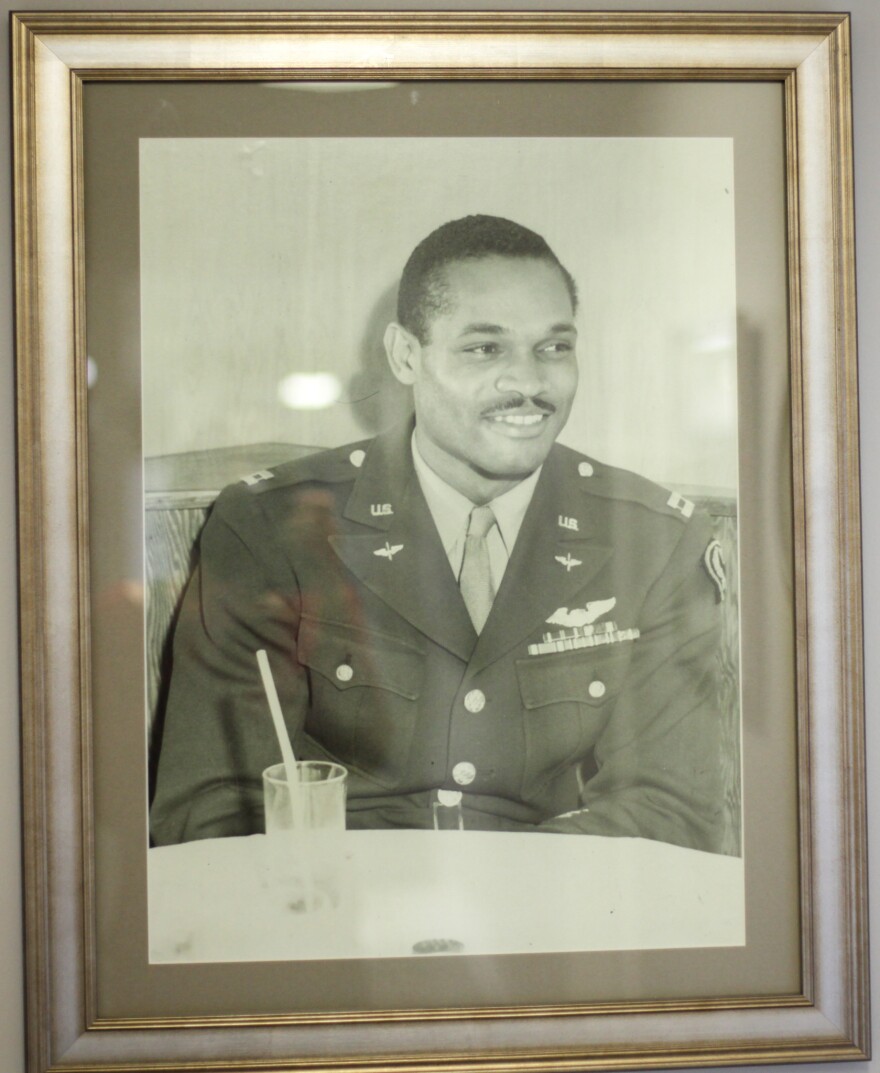On a recent weekend, Carlin Bratcher was back in the pilot seat of a single engine Cessna 172, practicing turns and softening her landings at the Olive Branch Airport in north Mississippi.
“Flying is the easy part,” says Bratcher, 29, who is training for her private pilot’s license at the Luke Weathers Flight Academy. The certification is an initial step towards her goal of flying for a cargo carrier like UPS or FedEx.
More challenging, she says, is mastery of a plane’s complex functions in case something goes wrong, such as the fuel or electrical systems.
“What we are really learning is ‘what if,’” she says. “If this happens, how to react to this instead of acting chaotic, we know what to do if we have a problem.”
At her side was flight instructor Zakiya Percy, who is also logging the 1,500 hours she needs to eventually apply at a major airline. She wants to be an international captain, specifically on a Boeing 777.

“Everybody has their favorite aircraft. It’s birthright,” she says with a laugh. “That’s your thing.”
As African American women, Bratcher and Percy are demographically underrepresented among aviators. African Americans account for just three percent of pilots and flight engineers, according to the Bureau of Labor Statistics. Women make up six percent of the profession, and advocacy organizations estimate that there are fewer than 150 Black female pilots.
The Luke Weathers Flight Academy is committed to boosting those numbers.
“Here…the female instructors outweigh the male instructors, and that’s a gem,” Percy says. “It’s really not seen at a lot of flight schools and the airline industry in general.”
The Organization of Black Aerospace Professionals (OBAP) launched the academy three years ago. It’s named after Lt. Col. Luke Weathers, a Tuskegee Airman and the first African American air traffic controller at Memphis International Airport.
Captain Albert Glenn, a retired FedEx pilot who runs the school, says one part of the mission is to expand opportunities for more women and racial minorities aspiring to earn their wings.
“They’re there,” he says. “There are individuals who want to be in the aerospace industry, but the pathway for them is a difficult one.”

For starters, pilot training is expensive–as much as $100,000 at some schools. As a nonprofit, Luke Weathers’ price tag is closer to $45,000. More than half of the school’s students receive scholarships and instructors encourage some group lessons over individual ones to help save money.
The financial burden, combined with a historic lack of representation in the airline industry, means many minorities may not even consider flying as a job option.
“If you take a young Black child out, and they see a Black pilot or they see a Black engineer, they have a different perception when they see that,” Glenn says.
That’s why the earlier youth are introduced to aviation or STEM fields, the better, Glenn says.
To leave an early impression, OBAP and the academy gear programming towards local middle and high schoolers. They offer camps to meet aviation professionals and even courses that give some a taste of the clouds, which is how Demitria Hale discovered her calling.
“The first time I went up in the sky with him, I was like, ‘Oh my goodness, yeah, I could do this for life,” says Hale, referring to an aviation teacher at East High School. He took her on a discovery flight her freshman year through a partner program with Luke Weathers. “Anything else doesn’t compare to this.”
Now at 19, and recently graduated, she’s pursuing her private pilot’s license at the academy, where she’s inspired by female pilots who’ve already broken barriers in the industry.
“Just seeing that representation is very effective,” she says.
Hale’s interest in flying comes at a time airlines are desperate for new talent, with some analysts predicting a shortage of about 12,000 pilots in North America by 2023 due to attrition and rebounding travel from the pandemic.
Shannon Morrison, who studies diversity in aviation at Ohio State University, says it’s a chance for the sector to get a makeover for the better.
“At the end of the day, a diverse community, diverse organizations perform better, and there’s a ton of years of research on that,” she says.
Companies are responding. United Airlines’ aviation school pledged that half of its 5,000 recruits over the next decade would be women or persons of color.
“Everyone needs to do something differently, quite frankly,” Morrison says, adding that aviation programs at universities should focus on creating more inclusive environments to better recruit and retain students from different backgrounds.

“Some of the women I interviewed for my book would talk about how...they had to try extra hard to prove [why] they’re there, and they weren't just chosen to be in the aviation program because they’re a Latinx individual,” Morrison says.
For flight instructor Zakiya Percy, good mentorship can be the difference between realizing a dream or not.
“When you’re trying to pursue something and you don’t have anyone to talk to and no one in your family is in aviation, you’re really battling against your own thoughts,” she says. “If you look at your own situation and say, ‘Hey flight training is going to be $100,000’…you’re assessing your personal situation and just don’t think it’s possible.”
She says Luke Weathers and OBAP understand this struggle and seek to help individuals chart a course to the cockpit.
“Even though it was more difficult for you, it can be easier for somebody else,” she says. “If we just have that mindset in everything we do.”
Easier, that is, for young people to enter a career where the sky is, literally, the limit.
“This is an extremely exciting thing to do,” she says. “It’s not just exciting, it’s life changing.”



